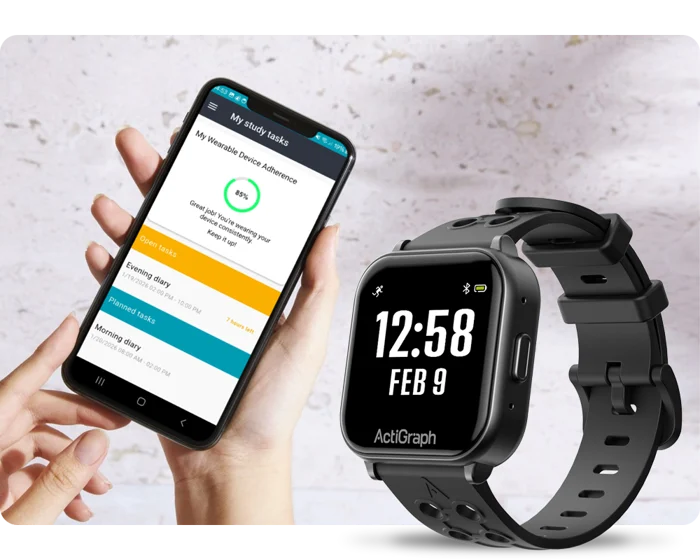In a clinical trials environment that is moving increasingly towards digitalization and decentralization, it remains crucial to maintain high-quality electronic Clinical Outcome Assessments (eCOA) data. This is paramount to ensure the success of a clinical trial, and when setting up an eCOA system you should:
1- Remember that eCOA is the most complex part, and that it is at the core of your clinical trial
As a means of collecting data directly from patients, eCOA is central to any clinical trial. Crucially, it represents the only direct input from the patient into the clinical trial, and includes a variety of complex processes. The complexities inherent to a well-functioning eCOA system include the migration of validated paper versions of patient questionnaires to electronic versions while maintaining the psychometric properties of the questionnaire, such as its reliability, validity, sensitivity, and specificity. Furthermore, the electronic version must be made available in all local languages used by patients in a particular clinical trial, and it is crucial to adhere to best practices throughout. Systems must also remain user-friendly to ensure a smooth experience for users, despite huge variability in their past experiences and preferences. These complexities of eCOA contrast to simpler systems that may only need to be available in English, may only be used at the study start and potentially for an amendment to the protocol, and which may not include modifiable licensed or certified questionnaires.
2- Integrate additional components to your core eCOA system
eCOA represents the most complex aspect of a clinical trial, and up-front consideration of the eCOA system and time spent in its development and implementation will mean that the most complex part of the trial is robust. From there, additional components can be added to this core, but it is vital first to spend time developing the eCOA system before integrating other, potentially simpler components.
The subsequent integration of technologies to build a platform is vital for the grouping of a complex range of tools that are becoming increasingly important with the shift of clinical trials towards digitalization. These additional technologies can include eCRF systems, various solutions for digital collection of critical trial endpoints, real-time data interfaces including wearables, Interactive Response Technology (IRT) systems, patient exit questionnaires solutions, and patient transportation or reimbursement systems. At this stage, the complexity will not necessarily sit in the systems themselves, but in maintaining the uniformity of these platforms across different patient populations, nationalities, and devices. Furthermore, the uninterrupted availability of the platform to all clinical trial patients is a prerequisite, together with the availability of helpdesk and support services across the globe. The successful set-up of such complex integrated platforms requires expert leadership as well as specific experience in the respective areas of interest.
eCOA is thus at the core of a clinical trial, and once an expert eCOA provider is appointed the integration of other aspects can follow in a logical and straightforward manner.
3- Think users: keep it simple and flexible!
Just because a system is complex does not mean that it must be complicated to use!
There is one way to keep it simple: build it with the users in mind. It is fundamental to work with both investigator sites and study patients or caregivers to develop a deep understanding of their needs as well as what is burdensome to them. Through interviews, discussions, and surveys, real insights can be collected, and it is key to incorporate their feedback to develop and implement strategic and targeted improvements that will help maintain simplicity in the user experience. Such improvements could include a single sign-on process, at least for a particular clinical trial, rather than requiring users (both study site staff and patients) to manage multiple logins, and it is important to ensure that ongoing updates to systems are implemented as easily as possible, eg, by using prompts for software updates that can take place at a convenient time for the user. Additionally, the provision of ongoing training is important to ensure that the users remain familiar with the interface and continue to provide the required data in a timely manner. Such training can be conducted not only remotely using videos and instruction manuals but also face-to-face through the provision of regular training courses and refreshers on-site. These training sessions can be provided both directly to users or to study site training staff (‘train-the-trainer’ sessions that can be performed by monitors) who can then cascade the relevant information to study staff.
As well as simplicity, flexibility for the user is key. When the integration of systems and platforms is being considered, the provision of flexibility and a choice of options is essential. These could include the option for the study participant to use either their own smartphone or a provisioned device in a Bring Your Own Device (BYOD) strategy to collect their eDiary and electronic Patient Reported Outcome (ePRO) data. Be sure to always have a back-up option available if needed, that could also be offered through a flexible option of a remote WebCOA solution or a spare provisioned device to collect from the study site. Considering televisits as an option (eg, when physical examinations are not needed), or offering a paper consent process instead of—or in addition to—electronic patient consent are also flexible approaches that help to make clinical trial participation more attractive for patients or families. Providing choice to the patient helps to improve their engagement with the clinical trial and their compliance with the data collection requirements, and as such is a vital aspect for the collection of high-quality clinical trials data.
eCOA is core to the success of a clinical trial, ensuring the collection of high-quality data through a simple and flexible user interface. eCOA is complex and the implementation of a well-designed system is key for optimal clinical trial data collection, allowing interoperable platforms and systems to be integrated subsequently in a simple and user-friendly manner. For the success of a clinical trial, an expert eCOA provider, capable of first implementing eCOA and then integrating other systems, is essential. Building on the experience of experienced functional leads and resources, an eCOA expert is able to provide flexibility in the implementation of quality systems, ensuring continuity in the collection of quality data in a rapidly evolving landscape.







